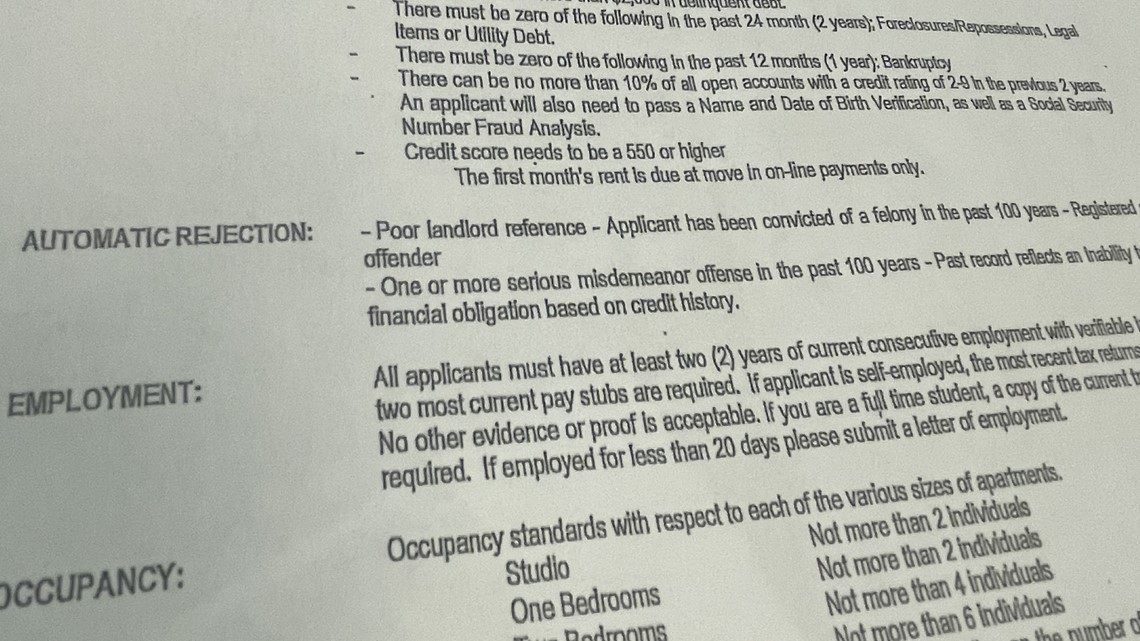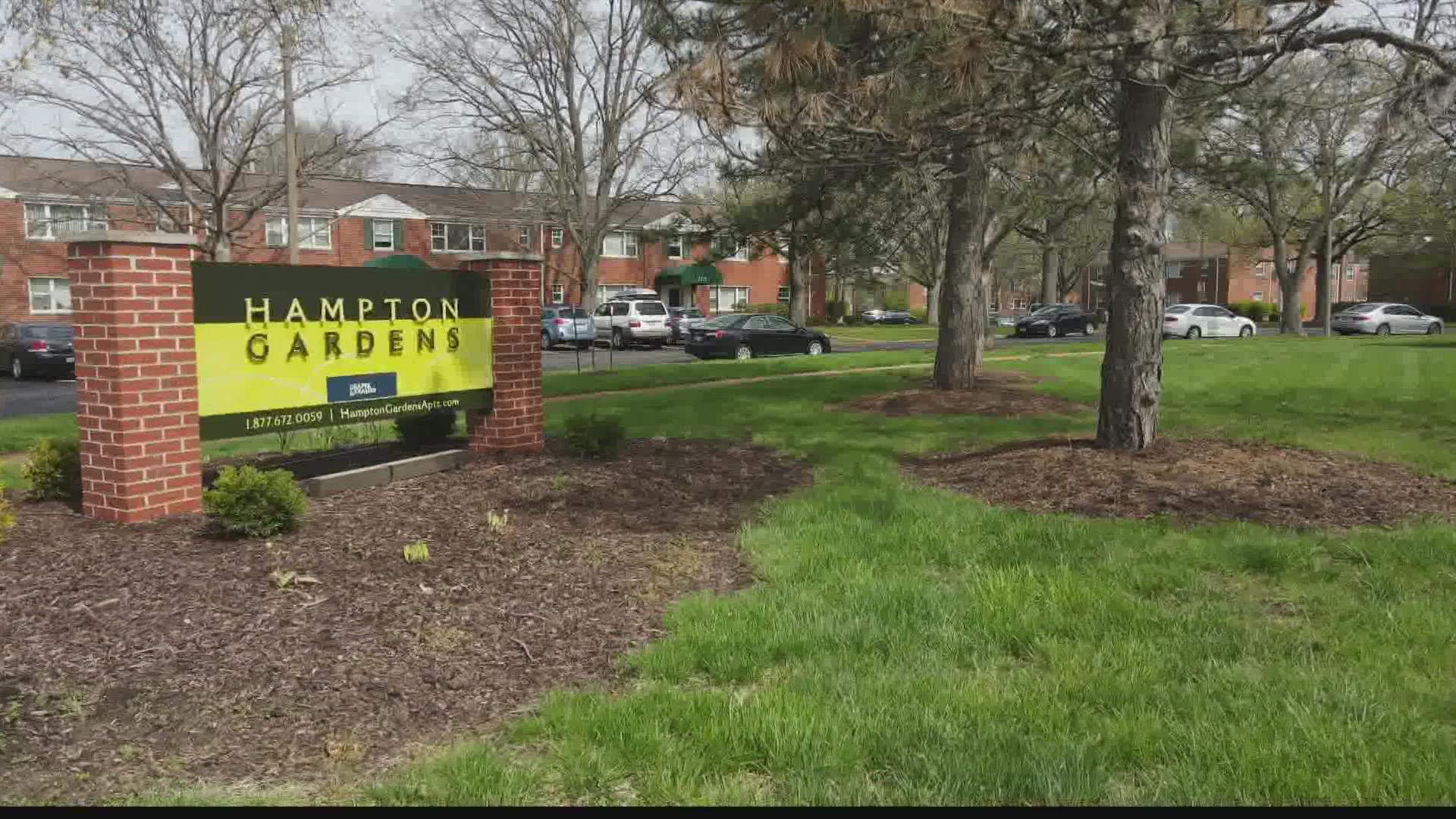ST. LOUIS — A St. Louis man is calling the policy of a local apartment complex "blanket discrimination," with potentially far-reaching consequences.
The apartment complex tells us it's committed to equal housing. And following our investigation, the complex now says it’ll be making changes to its paperwork.
It all started when Brandon Reid told the I-Team that a local housing complex was discriminating against him due to his criminal history. His first of two non-violent felony convictions happened when he was 18-years-old.
"I was just a kid that really wanted to fit in. I was a heavy drug user," said Reid, a St. Louis native.
He spent five years behind bars. He's been out of prison for 12 years.
"I donate to local charities, I pay my taxes," he said
He works at the St. Louis nonprofit Criminal Justice Ministry. The agency, located around St. Louis’ Lafayette Park neighborhood, provides jail and prison ministry, client re-entry services, and advocacy for community safety and criminal justice reform.
"Providing services to individuals who've been incarcerated," he said.
And he's a leader.
"I'm also the president of Pride St. Louis," said Reid.
He'll soon be working toward a master's degree at Washington University. But he says at one local housing complex, all they see is a threat.
About a month ago, Reid realized he was ready for a bigger space.
"This all started from me wanting a dog," he said.
He ended up in south city at the Hampton Gardens apartment complex.
"I asked them about their pricing, I asked them about their credit score," he said.
He also asked about its housing policy. He disclosed his two non-violent felony convictions from years ago.
"And they told me, 'Oh, no, no, no, no, no, if you've had a felony within the past 100 years, you're not eligible to apply,'" said Reid.


"How did you feel when you saw that policy?" asked KSDK's I-Team reporter Paula Vasan.
"Like I just got out of prison," he said.
Reid said the policy he was handed explains applicants face "automatic rejection" if they've been "convicted of a felony" or have had a "serious misdemeanor offense in the past 100 years."


"I was talking to my mom and I was like, 'Mom, this just doesn't feel right,'" said Reid.
In 2016, the U.S. Department of Housing and Urban Development warned blanket criminal bans may violate the Fair Housing Act. It stated such bans could be discriminatory, even if it wasn’t intentional. The federal guidance states that “a housing provider violates the Fair Housing Act when the provider’s policy or practice has an unjustified discriminatory effect, even when the provider had no intent to discriminate.”
"Is this housing complex being discriminatory?" asked Vasan.
"Absolutely," said Reid.


We showed up at the leasing office to get their side.
No one came out to talk with us. The I-Team called and emailed at least five times requesting an interview. They emailed us this statement on April 18:
“Hampton Gardens is committed to equal housing opportunity for all. As permitted under local, state and federal housing law, criminal background screening is conducted by a third party as part of the routine application process. While this policy is intended to protect residents, it is not meant to be punitive. For that reason, we encourage prospects to apply – even if it appears they may be rejected based on their criminal record or other factors such as employment history – as denials can be reevaluated upon request."
The company says the paperwork Reid was handed isn't their official policy. A spokesperson calls it outdated paperwork, and says they’re "taking action."
They told us in an email: "The document you forwarded is an information sheet of rental criteria. While the language included on it does not violate any local, state or federal housing law, the description of our rental criteria is outdated and does not represent the methodology used to accept or deny prospective residents at Hampton Gardens. We are taking action to revise this section of the document to conform with our actual leasing practices, which have been in place for many years. While our process does include criminal background screening conducted by a third party, rental decisions are not based solely on criminal history.”
Hampton Gardens management additionally tells us: “No practices or policies at Hampton Gardens violate the Fair Housing Act.” We asked a spokesperson at the complex if they are in touch with any local or federal agencies about Reid. They tell us: “No, because no practices or policies at Hampton Gardens violate the Fair Housing Act.”
On April 29, a spokesperson with Hampton Gardens said the company was sold, but they say they cannot disclose who they were sold to. The complex now has new management.
"It looks like they're trying to kind of cover, covering for themselves," said Reid.
Reid said his rejection shows how hard it is for people like him to find a place to live.
State data shows about 45% of people in Missouri who have gone to prison return within five years of their release, according to the Missouri Department of Corrections.
Housing advocates said easier access to housing means more stability, decreasing the likelihood people will return to crime.
“Oh, it's essential," said Tom Casey, Criminal Justice Ministry's Executive Director.
Casey, Reid’s boss, spearheads a housing program for hundreds of people in St. Louis.
“We provide them an apartment. They get a case manager, access to mental health support, substance abuse support," he said.
"How important is housing in ensuring that people who get out of prison don't go back?" asked Vasan.
"I think it's one of the major factors," he said.
Just 22 percent of people in the ministry’s housing program return to prison. That's less than half the state's average. Casey confirmed his nonprofit calculates recidivism, which refers to a return to criminal behavior, similarly to the Missouri Department of Corrections' calculation.
“Our rate for recidivism is much lower," he said.
It's why he urges landlords to give Reid and others a second chance.
"And really evaluate tenants on who they are today," said Casey.
Because today, Reid is a 35-year-old, who says his purpose is to help others.
"That's what kind of drives me to go wake up in the morning," said Reid.
He said if his experience can help people with criminal histories avoid housing discrimination, his efforts are worth it. According to The Sentencing Project, a research and advocacy center, as many as one in three U.S. adults — or 70 million Americans — have a criminal record.
He said he's not allowing mistakes to define his future. Just a few days ago, Reid found a new one-bedroom apartment. He moves in June 1.
Resources
If you’d like help with issues relating to housing, here are some St. Louis-based resources to help:
The Metropolitan St. Louis Equal Housing and Opportunity Council: a nonprofit fair housing agency working to end housing discrimination. They can be reached at 314-534-5800 info@ehoc-stl.org
Criminal Justice Ministry: CJM’s mission is to improve communities by supporting and empowering those impacted by incarceration.
Prosperity Connection promotes economic success for people in St. Louis through financial education classes, credit reviews, credit fairs, and financial coaching.
St. Louis Area Resources Directory has a list of additional resources.

